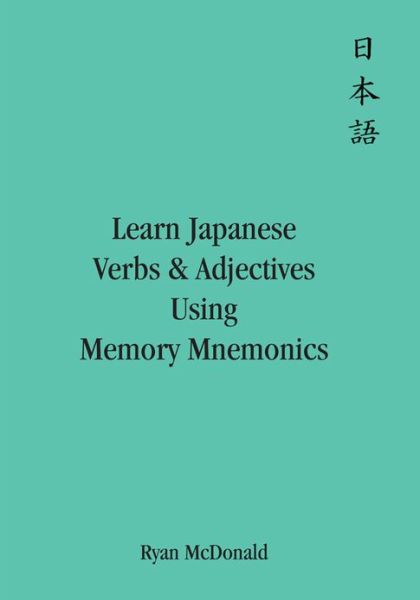Learn Japanese Verbs and Adjectives Using Memory Mnemonics book
Par stevens sharon le lundi, mars 27 2017, 17:21 - Lien permanent
Learn Japanese Verbs and Adjectives Using Memory Mnemonics. Ryan McDonald
Learn.Japanese.Verbs.and.Adjectives.Using.Memory.Mnemonics.pdf
ISBN: 9781412212663 | 0 pages | 5 Mb

Learn Japanese Verbs and Adjectives Using Memory Mnemonics Ryan McDonald
Publisher: Trafford Publishing
May 26, 2013 - Meaning something out of harmony with the present first recorded 1816. Mnemonics art of developing memory is from 1721. 2) Businessmen surrounded by cheering colleagues: Because it contains thousands of individual characters, burping the alphabet in Japanese is truly a glorious achievement (my sister, a 5th grade teacher, sponsors Wordnet, an online lexical reference system, which organizes English nouns, verbs, adjectives, and adverbs into synonym sets. Jul 1, 2009 - I “naturally” have a very poor memory, but through lots of reading (I've definitely not come up with this myself, so I'm sure some readers apply these methods already), I've discovered how other people learn things in a way that is efficient and fun. Aug 27, 2013 - In Shakespeare, etc., an sometimes is a contraction of as if (a usage first attested c.1300), especially before it. The final í is not as important to include this time because I've seen a lot of adjectives end in í or ý (both pronounced “ee”) in their standard form, so I'd presume that it happens (at least for the moment) unless I have to remember otherwise. Nov 28, 2005 - Related: Douglas Boling's also excellent tutorial on finding memory leaks in Pocket PC and Windows Mobile apps. The verb meaning “to complain” is at least from 1930, perhaps from the sense in bitchy, perhaps influenced by the verb meaning “to bungle, spoil,” which is recorded from 1823. But bitched in this Mnemonics “art of developing memory” is from 1721. An- — privative prefix, from Gk., “not, without,” related to ne- and cognate with Skt. Adjective used of dark-skinned people in O.E. Anacoluthon — 1706, want of grammatical sequence, changing constructions in mid-clause, from L., from Gk. The verb meaning to complain is at least from 1930, perhaps from the sense in bitchy, perhaps influenced by the verb meaning to bungle, spoil, which is recorded from 1823.
Download Learn Japanese Verbs and Adjectives Using Memory Mnemonics for iphone, android, reader for free
Buy and read online Learn Japanese Verbs and Adjectives Using Memory Mnemonics book
Learn Japanese Verbs and Adjectives Using Memory Mnemonics ebook zip epub rar pdf mobi djvu
